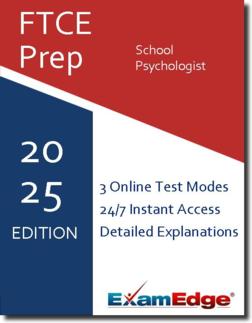FTCE School Psychologist (036) Practice Tests & Test Prep by Exam Edge - Topics
Based on 25 Reviews
- Real Exam Simulation: Timed questions and matching content build comfort for your FTCE School Psychologist test day.
- Instant, 24/7 Access: Web-based FTCE School Psychologist PK-12 practice exams with no software needed.
- Clear Explanations: Step-by-step answers and explanations for your FTCE exam to strengthen understanding.
- Boosted Confidence: Reduces anxiety and improves test-taking skills to ace your FTCE School Psychologist PK-12 (036).

Understanding the exact breakdown of the FTCE School Psychologist PK-12 test will help you know what to expect and how to most effectively prepare. The FTCE School Psychologist PK-12 has 100 multiple-choice questions The exam will be broken down into the sections below:
| FTCE School Psychologist PK-12 Exam Blueprint | ||
|---|---|---|
| Domain Name | % | Number of Questions |
| Knowledge of measurement theory, test construction, research, and statistics | 7% | 7 |
| Knowledge of data-based decision making and accountability | 13% | 13 |
| Knowledge of child and adolescent development | 10% | 10 |
| Knowledge of Section 504 of the Rehabilitation Act of 1973 (Section 504) and exceptional student education | 10% | 10 |
| Knowledge of curricula and instruction | 10% | 10 |
| Knowledge of biological, social, and cultural bases of learning and behavior | 12% | 12 |
| Knowledge of laws, rules, regulations, and court decisions | 5% | 5 |
| Knowledge of evidence-based interventions | 15% | 15 |
| Knowledge of consultation, collaboration, and problem solving | 10% | 10 |
| Knowledge of professional school psychology and ethical decision making | 8% | 8 |


